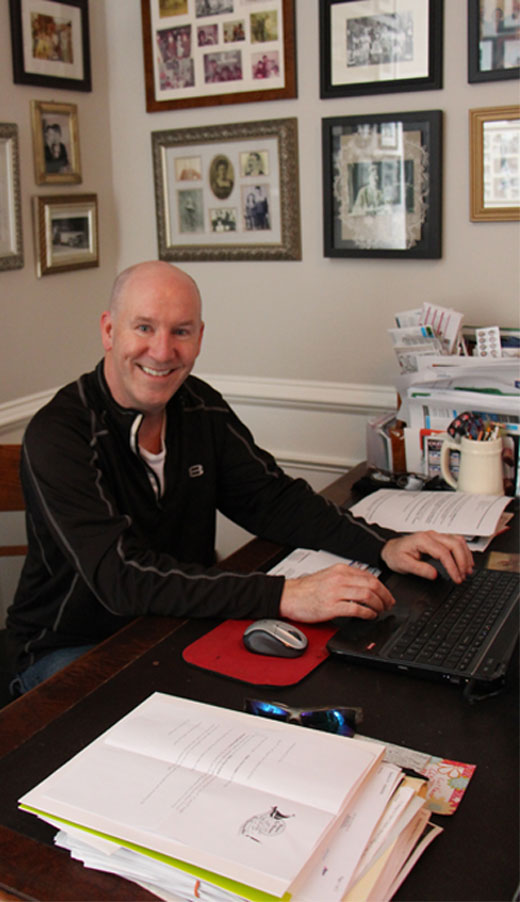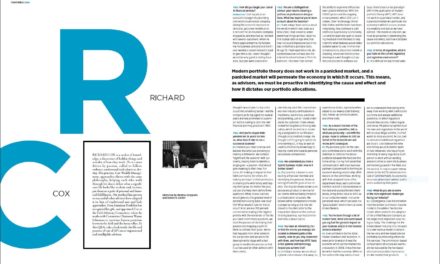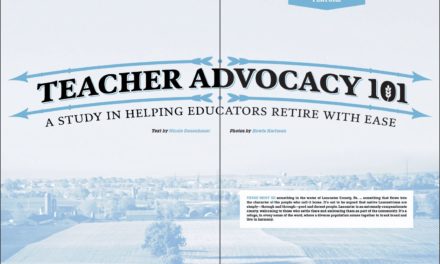
An Irish Proverb: You’ll Never Plow a Field by Turning it Over in Your Mind
American Portfolios Affiliated colleague, Andrew Corrigan has been sowing the seeds in the independent financial services field for some 20 or more planting seasons. While he and his family, and the many investing families he serves, have reaped the benefits of his labors, a changing climate has led Corrigan to rethink and plan for the future.
To view the full article please register below:

An Irish Proverb: You’ll Never Plow a Field by Turning it Over in Your Mind
For this American Portfolios (AP) affiliated colleague, it is his karma to be in a constant state of flux. So, he claims, there is an unrestful energy within him, much like that of a “Whirling Dervish.” Befittingly, he has ascribed his inner being to a spiritual, seventh-century-old practice, aligning the mind, heart and body towards perfection and truth. He is Andrew Corrigan and, unquestionably, is living proof of the natural, revolving order of things both in his professional and personal life.
A history that runs parallel to the original founders of AP, like CEO Lon T. Dolber and others who joined with him, Corrigan received his financial services sales training through First Investors Corporation. By 1988—and though Dolber was already nine years with the organization as a retail investment professional when Corrigan first began—at various points in their careers, they both gravitated towards the path of independence.
Growing up as a kid, Corrigan recalls the Friday night ritual after dinner of watching Wall Street Week, hosted by Louis Rukeyser, with his father.
“The funny thing is my father didn’t have a large portfolio, but he did have some mutual funds with First Investors; he was a blue collar type of guy with Master carpenter credentials. He did, though, have an interest in the markets. We all had to be quiet during that half-hour show where ‘Uncle Lou’—as he called him—would do his recap of the market and his update; I’d stay there and watch it with him.”
A New York Queens boy through and through and the oldest of three children born to Anne and Andrew Leo Corrigan, his parents were hardworking Irish Diasporas who, in the early 1960s and late 1950s, respectively, brought their carpentry and nursing trades to America. Growing up in Elmhurst—where his mother and father still live to this day—their home was filled with laughter and conversation in Irish brogue, where many a truth—and folklore—about ancestors and the old country were told and passed on to the next generation.
The influences of Corrigan’s parents instilling the importance of family, a strong work ethic, the gift of gab, a good Jesuit education leading into college and a penchant for helping others, laid the foundation for a successful future in a profession of his choosing. For Corrigan, the prescriptive plan that followed would draw unsettling—yet surprisingly promising—results. When he returned home from a summer-long backpacking trip in Europe after graduating from SUNY Geneseo with a bachelor’s in psychology and a minor in organizational occupational behavior, he diligently began sending out resumes and hitting the pavement for opportunities in his field. With no prospects on the horizon and still living at home with his parents, Corrigan felt demoralized. When his father showed him a letter from his First Investors representative about a move to a new office in Mineola, he scheduled an appointment with them and sat through the presentation.
“They said it was all on commission and they would sponsor me for my licenses. I felt that anxiety clock ticking to find a job. It was the best lead I had at the time, so I took it.”
By 1990, after two years in the business, Corrigan had qualified for a top producers meeting and, unbeknownst to him, learned that he could sell products outside of First Investors’ proprietary funds. With the junk-bond market crisis to contend with and feeling responsible for the clients who were impacted, he held their hands through the ordeal, made adjustments and, soon after, moved to a broker/dealer at a bank.
“I went over to Crossland Savings Bank and had to start from scratch. Then they were taken over by a group of investors and became Crossland Federal Savings. After this, they began changing the program around, so I left there and went to Chase.”
Circumstances beyond his control—from program changes, to mergers, to fold-ups—would result in Corrigan having to move from one broker/dealer to the next. It would take eight years from the time he entered into the business with First Investors and several broker/dealers later before he could settle into a place of independence. A blessing in disguise, that time came when an independent B/D firm he had briefly affiliated with shut down their operations three months into his transition; no sooner did he receive a call from Jay Lewis, founder of Nathan & Lewis Securities, inviting him to join his firm. That was in April 1997. A year prior, then supervising principal Lon T. Dolber and 100-plus investment professionals at American Portfolios prior to becoming a broker/dealer, would join Nathan & Lewis Securities, as well.
Corrigan was being supported well by his new independent B/D. In fact, a resulting partnership formed at a welcome meeting hosted by Nathan & Lewis, when Lewis observed a synergy between Corrigan and another colleague, Richard Petrocelli, who had also joined the firm after falling victim to the same delusive B/D shutdown. With both their offices located in Queens—Petrocelli’s established tax preparation fixture in Flushing and Corrigan’s growing, investment practice in an office he was renting in Bayside that was nearing the end of its lease—they joined forces. Corrigan moved to Flushing to work with Petrocelli, supporting the investment side of his business, while Petrocelli stayed more focused on tax planning.
Although Nathan & Lewis would be acquired shortly after their affiliation by Met Life’s subsidiary, New England Financial, Corrigan and Petrocelli enjoyed five years of unfettered independence, together growing their practices and providing comprehensive financial services and support to their collective clients. The first signs of a breach in that freedom came in 2003 when Nathan & Lewis was merged with Walnut Street Securities.
Corrigan and his colleague stayed with Walnut through the transition in 2003, although they did not feel they were truly independent. They started looking around and American Portfolios’ name came up a number of times.
“I remember visiting AP and sitting with Lon and others in a conference room. He was in front of a computer and was so excited about [demoing] the technology. I wasn’t a big tech guy and it was like entering the 21st century. I’ll never forget it. He was like a kid full of energy and enthusiasm. I saw the visionary part of him in that meeting.”
After Walnut held their business conference in September 2003, Corrigan saw the handwriting on the wall; by the end of the quarter, he and his colleague officially changed to AP.
For Corrigan, AP has provided a haven for his flourishing independent practice. In the last 12 years, he has increased his client AUM by 140 percent, built up a client base that is 60 percent greater than when he first joined AP and has doubled his earnings. Yet, such growth would come at a price. His wife Kellie of 18 years and close consigliere knows all too well the time, hours, care and concern he has personally invested in his clients and his business. For years, Corrigan has kept a six-day work week from January through April to coincide with the tax season. A year after joining AP, Corrigan and his family moved out of Queens to Long Island’s suburbs on the North shore, considerably adding to his travel time by an hour and 15 minutes each way. And with volatile markets in recent years since the great recession, the close contact and accessibility he has provided for his practice of more than 500 investing households has often held him into the evening hours for after-work appointments, preparation of quarterly reports and investment adjustments as needed.
“After 2008, I thought that was it … I’m going to take a big hit in revenue. [In retrospect], it wasn’t that bad, but I did work my tail off. I was meeting clients at their homes or at the office until 9 or 10 at night and making calls. At one point I wanted to bring in an air mattress and just sleep here. That’s how crazy it was. But it came back to me in 2009 with a big jump in 2010. Since then, it’s been gradual up until 2014, where I took an even bigger jump than the year before, and then 2015 was my best year ever.”

It is no coincidence that Corrigan’s explosive ramp-up in business would parallel that of AP’s. By relying on his B/Ds infrastructure and technology, and integrating it into his own back office, he created efficiencies in both the day-to-day processing of his business and management of time.
“I’m really not that much of a tech guy and feel that I haven’t used all that American Portfolios provides to its fullest extent—and, you know, shame on me for that. But one thing about technology is that it has saved my sanity. Because of it, in recent years I’ve been working from home on Fridays. Three or four years ago it started strictly in July and August. Then it became June, July and August and I’ve even begun extending it to May.”
His growing interest to learn and capitalize on the systems and services that AP provides prompted senior management to elect him as a member to the AP Advisor Council (APAC) at the end of 2013. An organization formed by AP to gain insights from a cross-section of its customers and help guide the decisions made to better serve its affiliated financial professionals in private practice, Corrigan is one of eight members acting in this role. In this capacity, he is also a participant in AP’s Priorities and Initiatives Committee, weighing in on the sigtificance and impact of the firm’s key technology development projects from the perspective of a customer.
“What’s nice about being on this council is I see things about AP in a different way. It’s like there’s so much that goes on behind the scenes. It’s really exciting.””
The timing of AP’s call to action for the next wave of growth could not have been more fortuitous for Corrigan. With evolving changes in financial services for a broader fiduciary standard and a growing shift towards fee-based advisory services, the means by which a service provider such as AP and a private practice like Corrigan’s would have to rise with the tide would be through building a business plan. When AP Chief Strategy Office Ed Morrison introduced to senior management and thereafter to its affiliated colleagues the business practices of entrepreneur Verne Harnish’s “Mastering the Rockefeller Habits” on how to grow the value of one’s business, Corrigan knew it was something he had to make time for.
“This kind of planning is important for me to focus on. It’s about looking at the big picture and knowing where you want to be 10 years or more from now. As Verne Harnish puts it, it’s about finding your “big hairy audacious goal.’”
In 2014, the business plan teachings—in coordination with AP’s Stars Aligned Tour, which were regional meetings intended to connect with and support affiliated advisors in the field, and introduce them to AP’s newly-packaged advisory services platform—laid a clearer path for Corrigan on where he needed to be and what actions would be required near-term to sustain his practice for the long run.
By the end of 2014, when AP began laying out its five-year growth roadmap—touching upon strategic perspectives in every area of the firm: people, innovation, process, customer, financial and community—Corrigan and his fellow colleagues on the advisory council were invited to critique its construction, offering suggestions that would draw more clarity and resonance for AP staff and affiliated colleagues. This first-hand knowledge was further motivation for Corrigan’s own inevitable change—moving his sizeable book of business to fee-based. A more pressing motivation for him has been the inevitable regulatory change imposed by the Department of Labor (DOL) mandating that qualified monies be held to a fiduciary standard, jeopardizing the ability of an investment professional who is doing strictly transactional business to service retirement accounts such as IRAs, 401(k)s and 403(b)s. Yet, his even greater motivation was proving to his wife that he is willing to make such a change.
“Sometimes it takes a woman to give you that proverbial kick in the pants and say, ‘Look, you’ve been telling me now that when you do this transition it’s going to be better for your business in the long run; so, why are you complaining about the long run?’ She’s very direct with me and will say, ‘You’re spinning your wheels and you’re wasting too much energy talking about this. Just do it.’”
It’s been an eye opening experience for Corrigan, delving into the advisory world and creating awareness on solutions he never knew he had access to.
“I cannot begin to tell you how many clients have come to me over the years asking whether I could handle something. Being that I was strictly mutual funds, I’d respond with such things like, ‘Well you can’t restrict certain companies from being in the portfolio because that is up to the mutual fund manager,’ or, ‘No, you can’t own those individual bonds unless it’s done through a brokerage account.’ Now, I have solutions for a lot of those questions.”
What’s more, the anticipated pushback from his clients when discussing the change to advisory has, thus far, been virtually nil.
“I say to my clients, ‘If this platform or this money manager that I’m suggesting doesn’t perform well, then we can move it into another strategist within the advisory world. and not have any penalties for doing that. The fee is the fee. And, even if the overall costs are slightly higher than what you have now, or in some cases lower, I think it’s beneficial because our interests are aligned; we’re on the same page.’ The responses all seem to focus on their appreciation that, above all, I am looking out for their portfolio.”
“When I first started learning about the fee-based side, I felt like a deer in the headlights. I was thinking, where do I begin? Then I took it one step at a time and found that by just talking to my peers and asking questions, I started to gain more knowledge and understanding. I also met with some of the focus managers like Advisor Capital Management, Hilton and AssetMark, and picked their brains about portfolios.”
In 2016, Corrigan’s goal is to move 40 to 50 percent of his mutual fund book of business to fee-based accounts. First and foremost, he will move the qualified assets approximating $30 million that he is at risk of losing because of DOL. Much of this qualified business will be done using select managers in Nine Points’ Manager’s Choice program, such as Hilton Capital for tactical investing, coupled with Nine Points Investment Management (NPIM) through Advisor’s Solutions for diversification.
“When I first started learning about the fee-based side, I felt like a deer in the headlights . I was thinking, where do I begin? Then I took it one step at a time and found that by just talking to my peers and asking questions, I started to gain more knowledge and understanding. I also met with some of the focus managers like Advisor Capital Management, Hilton and AssetMark, and picked their brains about portfolios.”
Another part of Corrigan’s game plan—in conjunction with moving the qualified accounts over to fee-based—is segmenting his clients, having one-on-one appointments and group meetings. With the support of AP’s business development area and others, he is conquering and dividing this massive undertaking.
In the grand scheme of things, through what could be considered his “big hairy audacious goal” to have enough sticky revenue coming in from managing those client relationships through advisory, Corrigan hopes to cut back his days in Queens, initially doing client appointments there three days a week from Tuesday to Thursday, with Fridays and Mondays at—or close to—home. The benefits alone to his cherished family—wife Kellie and two teenage children, Jack and Madelene, who adoringly cater to him—in curbing his admitted crankiness after long days at work and commuting to and from Queens will be worth its weight in blissful coexistence.
And not unlike the planting beds his wife built for him some years ago in their backyard—feeding his love of cultivating and growing things, and a reminder of his summer visits as a teenager to his aunt and uncle’s farm in Ireland—so, too, is Corrigan rotating the soil in his practice and professional life to grow something new and sustainable.
“This kind of planning is important for me to focus on. It’s about looking at the big picture and knowing where you want to be 10 years or more from now. As Verne Harnish (author of Mastering the Rockefeller Habits) puts it, it’s about finding your ‘big hairy audacious goal.’”











